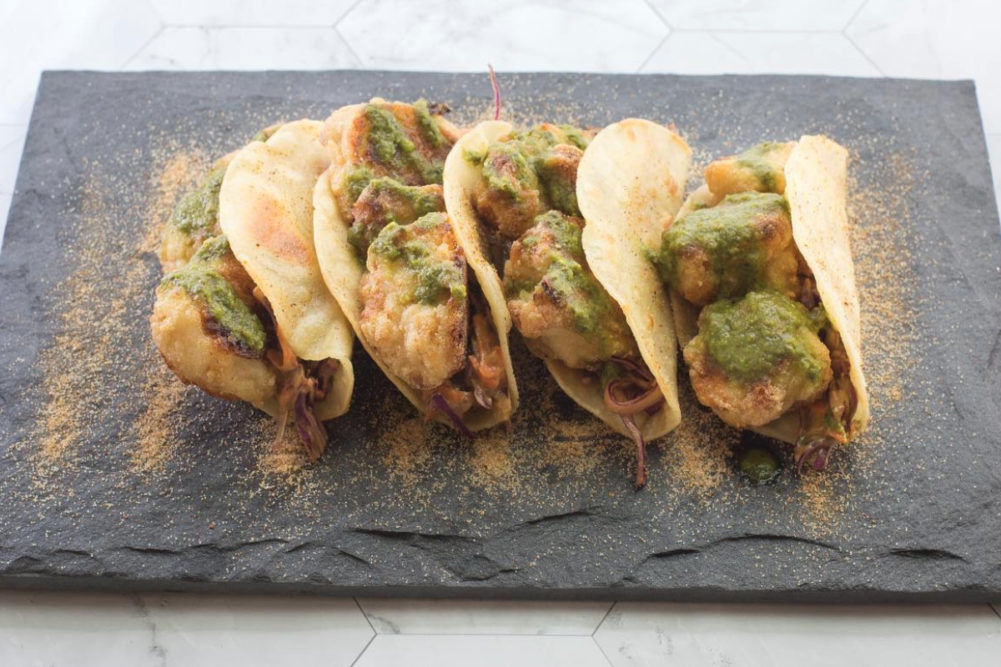Like all vegetables, cauliflower is a carbohydrate. It’s a non-starchy, complex carbohydrate high in fiber, low in sugar and loaded with nutrients, including folate (vitamin B9), which is essential for healthy cell growth and function, vitamin K for bone health and immunity-boosting vitamin C.
Around 2015, ground cauliflower started being used as a gluten-free, low-carbohydrate alternative to wheat flour for pizza crust. Since then, formulators have embraced cauliflower and have learned it can be breaded, fried, riced and more.
The NEXT trend database showed there were a mere 28 products formulated with cauliflower at Natural Products Expo West in 2017. At the 2019 expo, there were 104 products across 15 categories.
Consumers welcome the innovations. In fact, many are asking for them, as they appreciate that one cup of cauliflower contains about one-sixth the amount of carbohydrates in a cup of cooked pasta or rice.
Chipotle Mexican Grill, Newport Beach, Calif., for example, has started test marketing cauliflower rice at 55 restaurants in Denver and throughout Wisconsin. It is prepared fresh in-restaurant daily and made with grilled cauliflower that is seasoned with fresh-chopped cilantro, lime juice and salt.
“To date, one out of three new menu item requests from Chipotle customers is for cauliflower rice," says Chris Brandt, chief marketing officer. “We’ve answered the call from fans and created a better-for-you option that puts a delicious twist on our classic white rice recipe by using the same fresh cilantro and lime ingredients and culinary techniques.”
Gary Augustine, director of marketing, Van Drunen Farms, Momence, Ill., says, “Cauliflower is one of the most on-trend vegetables of 2020. New innovations like cauliflower pasta, tacos, pretzels and other shelf-stable cauliflower ‘grains’ are especially hot.”
Chefs have appreciated the versatility of cauliflower. It has a neutral taste and texture, and its whiteness provides a canvas for color.
“It works well in a wide variety of applications and is a flavor chameleon, transforming to taste like the flavors it is paired with,” Augustine says. “Cauliflower innovations also fit into most consumer diet trends, including paleo, vegan, low-carb and clean label. Formulators are reimagining classic dishes and snacks giving them a veggie-forward twist with cauliflower.”
Sigret Thompson, chef and co-owner, The Tasteful Kitchen, Tucson, Ariz., likes working with cauliflower steaks. They work well for the company’s meal-to-go-program, which allows the community to purchase prepared meals.
“I like to cut the cauliflower about an inch to an inch and half thick,” Thompson says. “They can be cut thinner but I think a thicker piece is more impressive. Over the years I have cooked cauliflower every way imaginable. In my experience, the best way is to par cook them.”
She suggests baking them at 350° for 7 to 10 minutes. After cooling, coat them in a light rice flour batter, followed by a dusting with some type of crumb. Then the cauliflower steak is roasted at 400° for another 10 minutes.
RollinGreens, Boulder, Colo., recently rolled out crispy, breaded florets designed to resemble chicken wings. They are sold in the frozen foods department.
“We use the whole floret to make our wings,” says Lindsey Cunningham, co-founder and chief executive officer. “Think tempura cauliflower tossed in one of three sauces: teriyaki, sweet mustard and our take on the classic buffalo sauce. Only it’s green. It’s made from 70% fresh spinach.”
Farm Rich, St. Simons Island, Ga., now offers breaded cauliflower bites as part of its frozen appetizer line. Whole cauliflower florets are rolled in a rice coating, delivering a quarter cup of cauliflower per serving. The finger food comes with a sweet sesame dipping sauce.
Los Angeles-based Caulipower added microwavable riced cauliflower cups to its range of cauliflower-containing foods, including frozen pizza and baked breaded chicken nuggets. The vegan, keto-certified, non-GMO cups come in three flavors and contain 3 to 5 grams of net carbohydrates per serving and no added sugar. Varieties are Baja-style with corn, black beans and red spices; curry with a subtle kick of turmeric and green herbs; and sesame citrus with red pepper, edamame and onion.
“We said we wouldn’t do riced cauliflower unless it was truly differentiated,” says Gail Becker, founder and chief executive officer. “We’ve hacked a meal hack by making a real meal out of riced cauliflower. The packaging is portable and microwavable, perfect for a healthy heat-and-eat at home snack, a healthy side for dinner or a grab-and-go lunch.”
Moss Landing, Calif.-based Sweet Earth Foods, which is owned by Nestle SA, is using cauliflower rice in one of its new plant-based frozen meals. The Chik’n Fajita is chicken alternative, black beans, onions, bell peppers, corn, poblanos and a tangy tomatillo poblano sauce over a bed of cauliflower rice.
“More than ever, today’s consumers are looking for plant-based options that are packed with flavor and convenient, especially when it might be harder to find traditional meat products on shelves,” says Jessica Vasisht, vice president. “Sweet Earth is meeting this demand by offering new plant-based options that appeal to flexitarians by satisfying cravings of traditional foods, but also provides plant-based nutrition and goodness in an easy, ready-to-heat format.”
Simply 7 Snacks, Houston, is using cauliflower flour in its new Sea Salt Veggie Straws. The cauliflower is used in combination with broccoli, carrots and potatoes, delivering one-third cup of vegetables per 1-oz serving.




